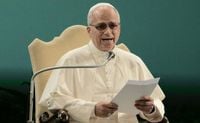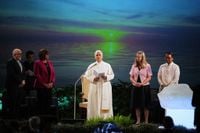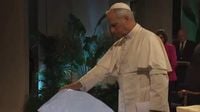On a crisp autumn day in early October 2025, the Vatican’s tranquil gardens and ancient halls buzzed with an energy rarely seen. Pope Leo XIV, the first American to ascend to the papacy, stood before a crowd of nearly 1,000 representatives from environmental and Indigenous groups, his presence commanding attention. The occasion: the 10th anniversary of Laudato Si', the landmark ecological encyclical issued by his predecessor, Pope Francis. But this was more than a commemorative event—it was a moment that signaled a bold new chapter in the Catholic Church’s commitment to environmental stewardship and moral leadership on the world stage.
The pope’s remarks, delivered from a stage adorned with tropical ferns and a melting block of Greenland glacier ice, cut straight to the heart of the climate debate. According to the Associated Press, Leo did not mince words as he addressed those who “ridicule those who speak of global warming.” He strongly embraced Francis’s environmental legacy, declaring, “We must shift from collecting data to caring, and from environmental discourses to an ecological conversion that transforms both personal and communal lifestyles.” His call was not just for awareness, but for a fundamental change of heart—a conversion that would ripple from the Vatican out into every corner of society.
This week’s events marked Pope Leo XIV’s first major address on climate change, and the timing was no accident. Just days earlier, U.S. President Donald Trump had dismissed global warming as a “con job” during a speech at the United Nations General Assembly, a move that reignited fierce debate in the United States and beyond. The pope’s response, though diplomatic, was unmistakable. Echoing Francis’s 2023 encyclical, Leo reminded the world that some leaders “deride the evident signs of climate change, to ridicule those who speak of global warming and even to blame the poor for the very thing that affects them most.”
“We cannot love God, whom we cannot see, while despising his creatures. Nor can we call ourselves disciples of Jesus Christ without participating in his outlook on creation and his care for all that is fragile and wounded,” Leo said, as reported by The Guardian and AP. The message was clear: for Christians, and indeed for all people of goodwill, environmental care is not optional—it is a moral imperative woven into the very fabric of faith and humanity.
Pope Leo XIV’s climate advocacy did not stop at strong words. Earlier in the summer, he approved a groundbreaking solar farm deal that will transform an agricultural field north of Rome into a vast array of solar panels. Once operational, this project is expected to make Vatican City the world’s first carbon-neutral state—a symbolic and practical step that underscores the Church’s commitment to leading by example. The pope also welcomed a new ecological training center in the gardens of Castel Gandolfo, which will focus on sustainable farming and the teachings of Laudato Si'.
During the anniversary gathering, Leo urged environmental and Indigenous groups to “put pressure on national governments to develop tougher standards to mitigate the damage already done.” He expressed hope that the upcoming United Nations climate conference “will listen to the cry of the Earth and the cry of the poor.” His words resonated with activists and diplomats alike, many of whom have grown frustrated with what they see as tepid political responses to the mounting climate crisis.
Leo’s approach to leadership has been distinctive from the start. Elected in May 2025, he inherited a Church deeply engaged with social justice issues but also riven by political and cultural divisions, especially in his native United States. Unlike Pope Francis, whose papacy was marked by frequent, sometimes fiery, critiques of U.S. policy, Leo has often favored a more measured tone—though he does not shy away from difficult truths when the moment demands it.
In late September, Leo addressed another contentious issue: the treatment of immigrants in the United States. Standing outside his residence at Castel Gandolfo, he questioned whether current U.S. immigration policies align with true pro-life values. “Someone who says I am against abortion, but I am in agreement with the inhuman treatment of immigrants in the United States, I don’t know if that’s pro-life,” he told reporters, as quoted by Reuters. He emphasized that “life is sacred from conception until natural death,” challenging Catholics and policymakers alike to embrace a consistent ethic of life that extends beyond abortion to include the plight of immigrants and the condemned.
This theme of moral consistency has become a hallmark of Leo’s young papacy. During a Jubilee audience in St. Peter’s Square on September 27, 2025, he addressed controversy within the American Church over honoring Senator Dick Durbin, a Democrat who supports abortion rights. While acknowledging the tensions, Leo urged the faithful to “look at the overall work that the Senator has done,” suggesting that moral evaluation cannot be reduced to a single issue. He added pointedly, “Someone who says I am against abortion but says I am in favor of the death penalty is not really pro-life.”
The pope’s interventions have sparked debate among Catholics and non-Catholics alike. Some conservative voices in the American Church have expressed discomfort with his willingness to challenge traditional boundaries, while progressives have welcomed his emphasis on social justice and environmental care. Yet Leo’s position is rooted in the Church’s teachings, not in partisan politics. He has called for an integrated ethic—a vision of dignity that transcends borders and party lines.
Leo’s climate advocacy, in particular, has drawn praise from international observers. At the Raising Hope for Climate Justice conference at the Vatican on September 30, he stood in front of a melting block of ice, a stark symbol of the planet’s fragility, and reaffirmed the Vatican’s commitment to leading the fight against global warming. He reminded the audience that the challenges identified in Laudato Si' are “even more relevant today than they were 10 years ago,” and urged everyone—from NGOs to ordinary citizens—to “put pressure on governments to develop and implement more rigorous regulations, procedures, and controls.”
“Citizens need to take an active role in political decision making at national, regional, and local levels. Only then will it be possible to mitigate the damage done to the environment,” Leo said, as reported by TIME. His message was one of shared responsibility and collective action—a call to move beyond slogans and to embrace the hard work of ecological conversion.
As the world looks ahead to critical climate negotiations and grapples with rising temperatures, Pope Leo XIV’s voice stands as a moral anchor. By weaving together the Church’s teachings on life, justice, and stewardship, he has challenged both the faithful and the powerful to reconsider what it truly means to care for creation—and for each other. In a time marked by division and doubt, his words offer a vision of hope rooted in action, compassion, and unwavering conviction.



